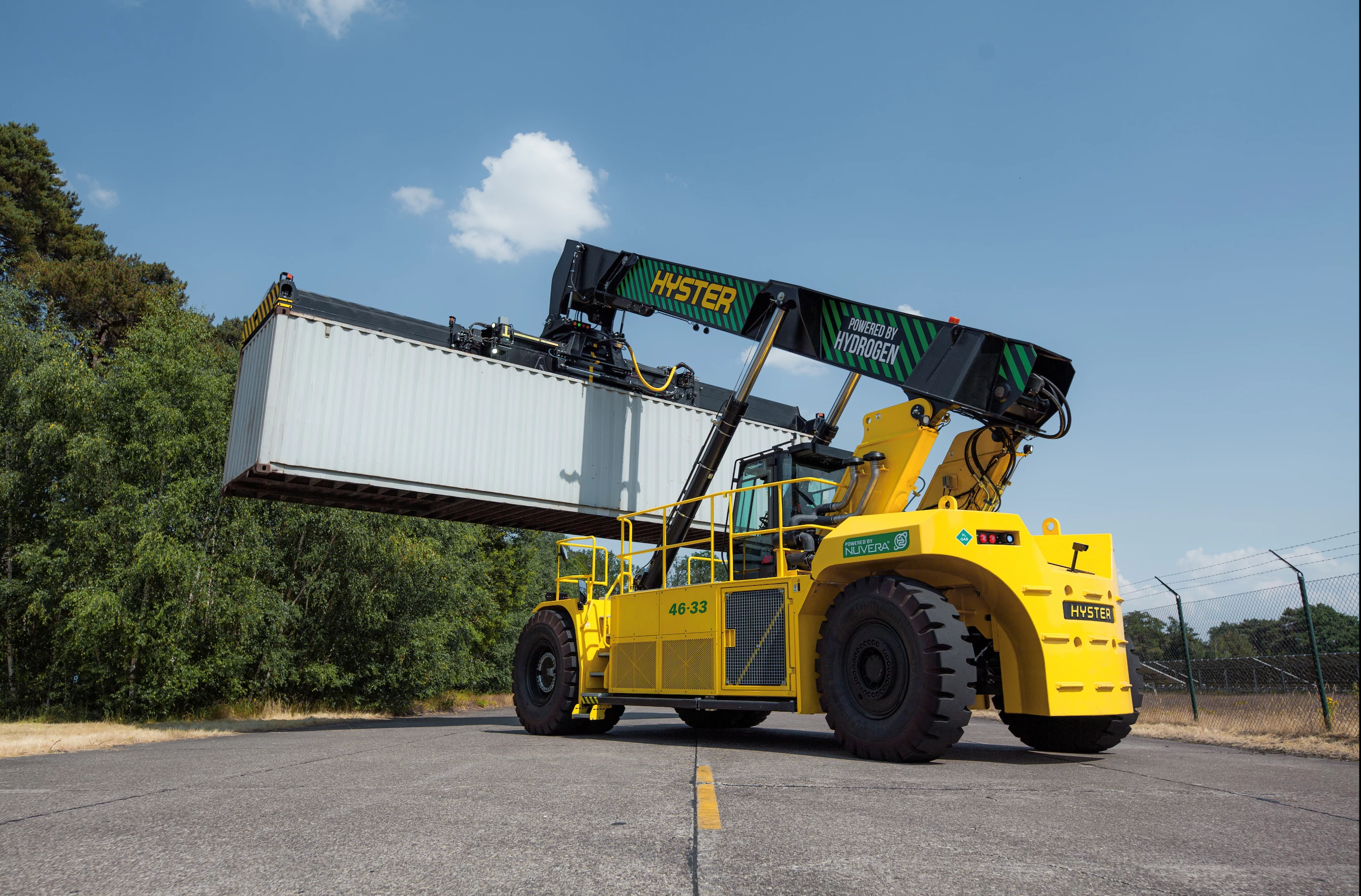Hyster is at the forefront of innovation, offering a diverse range of solutions designed to meet the unique challenges faced by this sector, including zero-emission options and robust container handling machinery.
ZERO-EMISSION TERMINAL TRACTORS: PIONEERING SUSTAINABILITY
One groundbreaking Hyster development involves collaborating with Capacity, a yard truck brand, to develop a zero-emission terminal tractor. The first pilot truck for Europe, powered by Nuvera hydrogen fuel cells and which will be fuelled locally at the HHLA Hamburg Green Hydrogen Hub, exemplifies our commitment to sustainability. Furthermore, Hyster is designing Battery Electric Terminal Tractors, ready for autonomous charging, to simplify the transition to zero-emission solutions in ports, terminals and distribution centres.
Our efficient and dependable zero-emission Terminal Tractors are currently a development pilot. These Terminal Tractors feature a number of innovations, including powershift transmissions, to ensure optimal performance and productivity.
INNOVATIVE ELECTRIFICATION PROJECTS FOR CONTAINER HANDLING
Hyster is spearheading industry-first solutions for practical applications. These initiatives include testing the first-ever Laden Container Handler powered by a Nuvera hydrogen fuel cell at the Port of Los Angeles and development of hydrogen fuel cell-powered Empty Container Handlers and terminal tractors at HHLA in Hamburg.
Additionally, Hyster has committed to delivering a 100% lithium-ion battery-powered Container Handler to CARU Containers. These projects signify Hyster’s dedication to providing cutting-edge solutions that address real-world challenges in ports and terminals.
Most recently, Hyster has developed and shipped a hydrogen fuel cell ReachStacker to the Port of Valencia in Spain. The ReachStacker is part of the H2Ports project, which aims to introduce hydrogen-powered vehicles and equipment in port operations. Thanks to its Nuvera Fuel Cell Engine, the hydrogen fuel cell ReachStacker offers significant advantages over its conventional diesel-powered machines with regards to greenhouse gas emissions, noise pollution and operating costs.
HYDROGEN VS. LITHIUM-ION BATTERIES
The right choice of power option, hydrogen or lithium-ion batteries, depends on the specific application. Lithium-ion battery-powered trucks are well-suited for operations with ample access to electricity, enabling fast and simultaneous charging of multiple vehicles. However, managing peak power demand can be complex for some applications.
Conversely, hydrogen fuel cell solutions require a robust infrastructure for hydrogen fuelling, including sourcing hydrogen and potentially investing in specialised hydrogen fuel station solutions. Hyster emphasises the importance of selecting the right power option based on individual application needs and customers should consult their local Hyster dealer to find the most suitable solution.
HYDROGEN FUEL CONSIDERATIONS
While hydrogen-powered ports and terminal equipment offers many of the benefits of traditional ICE-powered trucks, there are a number of extra factors to consider.
While Hyster is happy to support customers in identifying potential suppliers, end-users are ultimately responsible for sourcing and adhering to local regulations surrounding hydrogen fuel.
Just like diesel, Hydrogen is a flammable substance. In the design of our trucks, we have taken precautions to reduce the risk of unexpected events. Safety features include hydrogen “sniffers” and pressure temperature sensors that automatically shut off valves in the event of unexpected leaks, or temperature increases. Additionally, Hyster employs industry-standard type 3 and type 4 hydrogen tanks, certified for up to 15 years with proper maintenance. The truck design also minimises pressure on the tanks and includes shut-off valves for added safety.
EFFICIENCY IN ZERO-EMISSION CONTAINER HANDLERS
Hyster zero-emission Container Handlers are designed for efficiency and productivity. They feature patented energy recovery systems that recover and store energy during lowering and braking processes. These innovative systems extend truck operating range, increasing uptime and reducing energy costs. For example, the top loader container handler in testing at Fenix Marine Services has demonstrated up to 15% energy recovery, illustrating the substantial efficiency gains of Hyster solutions.
IMPACT OF ELECTRIFICATION DEVELOPMENTS
The electrification developments by Hyster have significant implications for the industry. Ports, terminals, and related operations are actively seeking electrification solutions to reduce emissions, in response to both internal sustainability goals and government regulations. Hyster has invested in strategies and solutions to electrify high-capacity equipment to help meet these needs without any lingering doubts about equipment performance and support. This is crucial for the successful adoption of sustainable practices in the industry.
PREPARING FOR WIDESPREAD ADOPTION
Where the Ports and Terminals industry shows an appetite for zero-emission equipment solutions, Hyster will continue to develop innovative and advanced container handling machinery and terminal tractors. As the industry continues to evolve, Hyster stands as a reliable partner for businesses seeking to navigate the challenges and opportunities in the world of ports and terminals.

